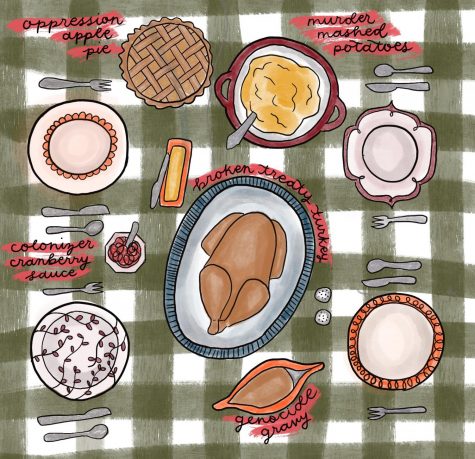Reciprocity lost: Thanksgiving’s dark origin

Each year, on the fourth Thursday of November, families and friends across the U.S. gather to express their gratitude for one another and various aspects of their lives. While this occasion has had mostly positive implications from recent years until now, its origins are hardly favorable. The atrocities faced by Native Americans at the hands of white colonizers define the history of Thanksgiving, and they cannot be forgotten as long as this holiday is celebrated.
Robin Wall Kimmerer eloquently explains the life and thanksgiving of the Native Americans before the colonizers intruded upon their land in her book, “Braiding Sweetgrass.” She tells the story of the Old-Growth communities where people lived amongst massive trees in the Pacific Northwest and enjoyed great natural wealth. Their prosperity came from their intricately reciprocated relationship with nature. They only took whatever plants they needed from the earth, thanking the earth for the gifts all the while. In return, they sowed more seeds to return the plants back to their origins and to make sure that the generations to come could enjoy the same gifts. Wealth was built on the ideas of having enough to give away, and the cedars taught them how to share it. This relationship of giving and receiving that they learned from the trees was passed on to interpersonal relationships, as they would give to one another with the understanding that something would be given in return. Thanksgiving was a way of life.
These traditions would be disrupted after the Pilgrims arrived in New England to escape religious persecution in Britain. Having learned how to plant, harvest, cultivate and hunt from the Wampanoag tribe after being malnourished and ill, the pilgrims celebrated their first Thanksgiving alongside the tribe in 1621.
Unfortunately, this apparent harmony did not last for long. In the decades to come, these settlers slowly usurped the Wampanoag lands while decimating their population through the spread of disease. In 1675, what was left of their amicable ties were abruptly cut as a treaty violation resulting in the execution of three Native men caused war to ensue. The English won with more than two-thirds of their population remaining compared to half of the Native population.
Since then, the colonizers held onto their control over Native Americans and forced them to assimilate in hopes of erasing their culture. In 1830, the Indian Removal Act allowed the government to separate Native American tribes by moving them to unsettled lands in exchange for their land. Native schoolchildren were also forced to attend boarding schools from the 1860s to the 1960s, where they were punished for speaking their languages or participating in their traditions. Thus, much of their culture was effectively eliminated.
The English colonizers had an opportunity to be grateful for a new land with new possibilities, but instead, they took advantage of the Native Americans and became the very oppressors that they were trying to escape. Therefore, when celebrating Thanksgiving this year and in years to come, non-native Americans have to realize the significance of this celebration and honor the Native American lives and cultures that have been lost since this tradition began.
Your donation will support the student journalists of Tulane University. Your contribution will allow us to purchase equipment and cover our annual website hosting costs.



